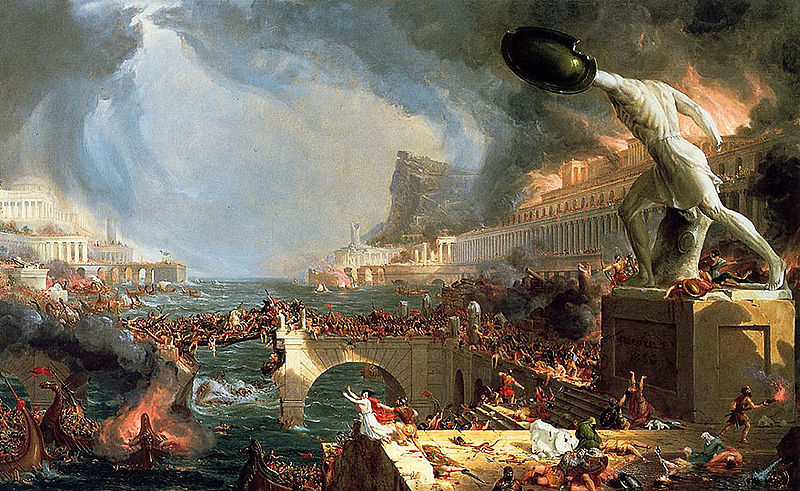Is it possible to have a society without cruelty?
That’s really the fundamental political question. (Economics, as you know, is a subset of politics, not different from it. So it’s also the fundamental economic question.)
It’s fair to say that there has never been a major society without cruelty baked into it, at least not since the rise of agricultural kingdoms about three thousand years after the invention of agriculture. Previous societies often had a lot of violence, but it’s not clear they all did, and some hunter gatherer band level societies seem to have had little cruelty.
But every major agricultural civilization has been cruel, and so has every major industrial society, though some are less cruel than others (insert reference to Scandinavia). Even those, however, are enmeshed in a system of industrial production that is, at best, exploitative, as in the case of conflict minerals, low paid workers, killed union organizers, and so on. Because it is not possible to run a decent society in the modern work in autarchy, even relatively kind societies are enmeshed in economic arrangements that cause great suffering hundreds to thousands of miles from them.
Cruelty is endemic even in good societies in the sense that our fundamental economic relationships are based on coercion; if you don’t work for someone else, probably doing something you wouldn’t do without the whip of poverty at your heels, and under supervision, well, you will have a bad life. School is based on coercion; do what you’re told when you’re told, or else, and so is work for most people.
That’s just the way our societies work, and while details vary, it’s more or less how they’ve worked since agriculture. Oh, the peasant may not have had close supervision, but they gave up their crops, labor, and lives under threat of violence, and they knew it well.
Even positive incentives are coercive. Get good grades and you’ll get a good job, etc… Please the mast… er, I mean, boss, yes, boss, and you may get a raise.
But a great deal of real cruelty lies behind the positive coercion in our major societies. American jails are startlingly cruel, filled with violence, rape, and fear. Chinese prisons aren’t so nice either. Police exist to throw you out of your house if you fail to pay the rent, which some double digit percentage of Americans are about to experience, because their society has mishandled an epidemic.
Sell cigarettes without the sanction of the state and your last words may be, “I can’t breathe.”
Our societies are based on positive and negative incentives. The amount of each varies with time and place. Finland right now has a lot more positive, and a lot less negative and a lot less consequences for disobeying. 50 years ago, the US put a lot less people in jail and gave those it allowed good jobs (white males) much better, nicer lives.
But there’s still always that threat in the background. And it’s always based on cruelty: “Bad things will happen to you, either actively or passively if you don’t go along.”
Now there are things we need to get done, collectively, in society. Build and maintain housing, grow and distribute food, keep the internet running (these days), but how much cruelty and coercion is required to do those necessary things? How much do you have to threaten people to get them to do those things? How cruel do you have to be to them if they don’t do them?
But another problem is that most of the coercion and cruelty in our societies has nothing to do with creating necessities like food and shelter and medicine and internet.
It has to do with making sure that some people have far more than they need, and others have far less. That some people have good lives with little coercion, while others live in constant fear. One problem with the boss, you lose your job, and you wind up homeless or in prison, and then even more terrible things happen.
Terrible things that are meant to happen, of course. We could lock up a lot fewer people and treat those few far better. We have more empty homes than homeless people and throw out at least a third of our food. No one need go hungry or homeless, and as for the internet, well, ISPs make close to 100 percent profit, so yeah, I’m pretty sure there’s no reason anyone should go without basic internet access.
So the cruelty in our societies is a choice. We can feed and house everyone, give everyone health care and have plenty left over, but we want billionaires and huge militaries or something, so we’re cruel. We’re cruel in the small details of everyday life (those maste…, er bosses) and we’re cruel in how we structure life, and it’s all a choice we’ve made.
Is it necessary? Must we be cruel? If we must be cruel, how cruel? What cruelty is actually needed, how much is just a preference or only required because we want very unequal societies?
Are we cruel of necessity?
Or desire?
If you enjoyed this article, and want me to write more, please DONATE or SUBSCRIBE.

